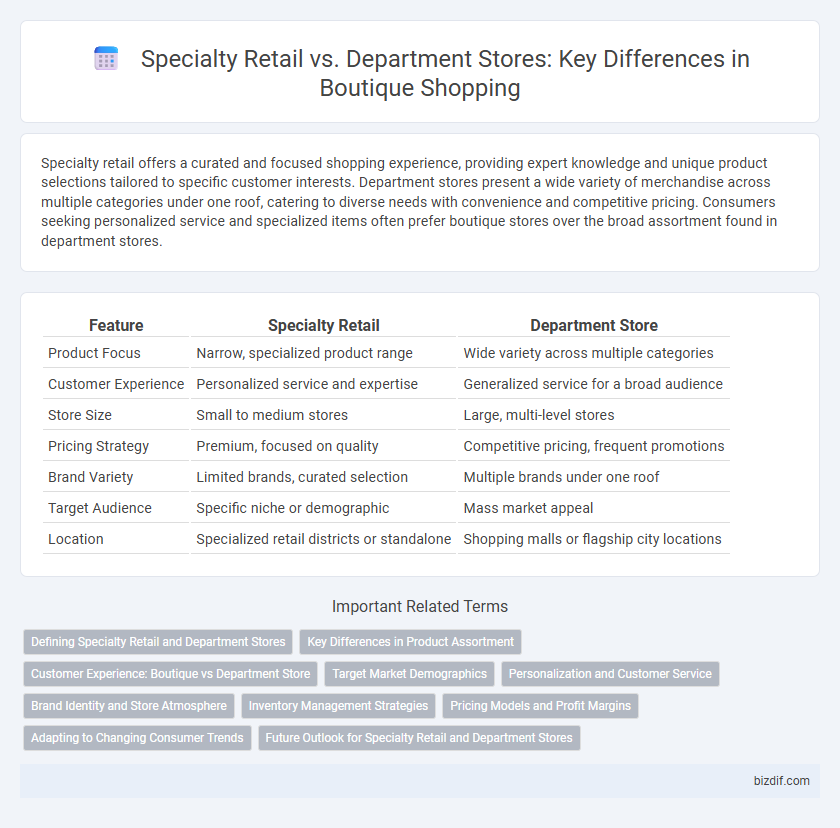Specialty retail offers a curated and focused shopping experience, providing expert knowledge and unique product selections tailored to specific customer interests. Department stores present a wide variety of merchandise across multiple categories under one roof, catering to diverse needs with convenience and competitive pricing. Consumers seeking personalized service and specialized items often prefer boutique stores over the broad assortment found in department stores.
Table of Comparison
| Feature | Specialty Retail | Department Store |
|---|---|---|
| Product Focus | Narrow, specialized product range | Wide variety across multiple categories |
| Customer Experience | Personalized service and expertise | Generalized service for a broad audience |
| Store Size | Small to medium stores | Large, multi-level stores |
| Pricing Strategy | Premium, focused on quality | Competitive pricing, frequent promotions |
| Brand Variety | Limited brands, curated selection | Multiple brands under one roof |
| Target Audience | Specific niche or demographic | Mass market appeal |
| Location | Specialized retail districts or standalone | Shopping malls or flagship city locations |
Defining Specialty Retail and Department Stores
Specialty retail stores focus on a specific product category or niche, offering curated selections and personalized customer service that highlight expertise and unique inventory. Department stores provide a wide range of product categories under one roof, including clothing, home goods, and electronics, aiming for convenience and variety across multiple brands. The key distinction lies in specialty retailers' targeted, expert offerings versus department stores' broad assortment and multiservice shopping experience.
Key Differences in Product Assortment
Specialty retail boutiques typically offer a curated selection of niche products tailored to specific tastes or categories, providing unique, often high-end items with a focus on quality and exclusivity. Department stores stock a broader assortment across multiple categories, emphasizing variety and convenience to appeal to a wide consumer base. This key difference in product assortment influences shopping experiences, inventory management, and marketing strategies within each retail format.
Customer Experience: Boutique vs Department Store
Boutiques offer a personalized shopping experience with tailored customer service, exclusive product selections, and an intimate atmosphere that fosters strong brand loyalty. Department stores provide a broader range of merchandise under one roof, but often lack the customized attention and unique ambiance found in boutique settings. Specialized customer interactions and curated collections make boutiques preferred for shoppers seeking distinctiveness and exceptional engagement.
Target Market Demographics
Specialty retail boutiques typically attract a niche target market characterized by high-income consumers seeking unique, curated products and personalized shopping experiences. In contrast, department stores cater to a broader demographic, encompassing diverse age groups and income levels by offering a wide range of products under one roof. Understanding these distinct target market demographics enables businesses to tailor marketing strategies and merchandise assortments effectively.
Personalization and Customer Service
Boutiques excel in personalization and customer service by offering tailored product selections and intimate shopping experiences that cater to individual preferences, unlike department stores that often prioritize variety and volume. Specialty retail stores invest in deep customer relationships and expert staff who provide personalized recommendations, enhancing customer satisfaction and loyalty. This focused approach allows boutiques to deliver unique, curated items and attentive service that department stores typically cannot match due to their broader market reach.
Brand Identity and Store Atmosphere
Specialty retail boutiques emphasize a strong, cohesive brand identity through curated product selections and personalized service, creating an intimate and distinctive store atmosphere that resonates with niche customers. Department stores offer a broader variety of brands under one roof but often lack the focused ambiance and tailored experience found in specialty boutiques. The boutique environment fosters deeper brand loyalty by aligning the store design, merchandising, and customer interactions with targeted lifestyle values.
Inventory Management Strategies
Boutique inventory management prioritizes curated, high-turnover stock tailored to niche customer preferences, enabling personalized shopping experiences and rapid adaptation to trends. Specialty retail leverages limited SKU counts and exclusive product lines to maintain inventory freshness and reduce holding costs, relying on just-in-time replenishment systems. Department stores manage extensive, diverse inventories across multiple categories and brands, utilizing advanced inventory management software and central distribution centers to optimize stock levels and minimize markdowns.
Pricing Models and Profit Margins
Specialty retail boutiques typically employ premium pricing models targeting niche markets, resulting in higher profit margins due to exclusive, curated selections and personalized customer service. Department stores use volume-based pricing strategies with frequent discounts and promotions, which lead to lower profit margins but higher sales volume through a broader product range. The focused inventory and brand differentiation in specialty retail create opportunities for sustained profitability despite lower sales volume compared to department stores.
Adapting to Changing Consumer Trends
Boutiques excel in specialty retail by offering curated, unique products that align closely with niche consumer preferences, enabling rapid adaptation to shifting trends. Their smaller scale facilitates personalized customer experiences and flexible inventory adjustments, contrasting with department stores' broader product range and slower response times. This agility allows boutiques to capitalize on emerging fashion movements and consumer demands more effectively than larger, traditional department stores.
Future Outlook for Specialty Retail and Department Stores
Specialty retail is projected to experience significant growth due to its ability to offer personalized shopping experiences and niche product selections, appealing to increasingly discerning consumers. Department stores face challenges from evolving consumer preferences and e-commerce competition but are adapting by integrating omnichannel strategies and experiential retail concepts to remain relevant. The future outlook suggests specialty retailers will continue to capitalize on customization and brand loyalty, while department stores must innovate to sustain market share in a digital-first landscape.
Specialty Retail vs Department Store Infographic

 bizdif.com
bizdif.com